Tabletalk Magazine (Mar. 2013–Aug. 2014) (18 issues)
Digital Logos Edition
Overview
Tabletalk magazine delivers fresh perspectives and discussion for your Bible study. Formed in 1977, Tabletalk continues to challenge and encourage readers to dig deeper into the Word of God in order that their lives may be transformed through the renewing of their minds (Rom. 12:1–2). In each issue, daily Bible studies take readers through the Bible, while theological articles by R.C. Sproul and other noted scholars address a particular theme each month.
Over the years, Tabletalk has been recognized for its excellence through several awards. Today, people all over the world read Tabletalk on a daily basis. The magazine is regularly found in seminary libraries and churches throughout the country. This collection provides the valuable insights of Tabletalk with issues from March 2013 through August 2014.
With Logos, Tabletalk is enhanced by amazing functionality. Scripture citations link directly to English translations, and important terms link to dictionaries, encyclopedias, and a wealth of other resources in your digital library. Perform powerful searches to find exactly what you’re looking for. Take the discussion with you using tablet and mobile apps. With Logos Bible Software, the most efficient and comprehensive research tools are in one place, so you get the most out of your study.
Complete your collection with Tabletalk Magazine (Feb. 1989–Feb. 2013).

Key Features
- Contains articles by a variety of Christian scholars and leaders that provide detailed and thought-provoking coverage of important topics
- Includes daily, in-depth studies guiding readers through one or more books of the Bible each year through rich yet easy-to-understand exposition, and practical applications
- Provides an easy and effective program for reading through the entire Bible in a year
- Offers trusted resources for further study
Contributors
- R.C. Sproul
- John Piper
- Sinclair Ferguson
- Joel Beeke
- Derek Thomas
- Iain Campbell
- Jared Wilson
- Tim Challies
- Burk Parsons
- John MacArthur
- Justin Holcomb
- Randy Alcorn
- J.D. Greear
Praise for the Print Edition
Tabletalk has been a key ingredient in the diet of Christians conscious of their spiritual vitality.
—Michael S. Horton, professor of theology and apologetics, Westminster Seminary, CA
Month by month, Tabletalk represents an oasis in a desert of false spirituality, mindless Christianity, and vapid conviction. Tabletalk represents theological rigor, biblical Christianity, and authentic Christian devotion. It is an antidote to the world of superficial Christianity. Read it and grow.
—R. Albert Mohler Jr., president, Southern Baptist Theological Seminary
Tabletalk has been a wonderful resource in my own daily walk with the Lord.
—Ravi Zacharias, visiting professor, Wycliffe Hall of Oxford
Product Details
- Title: Tabletalk Magazine (March 2013–August 2014)
- Executive Editor: R.C. Sproul
- Editor: Burk Parsons
- Series: Tabletalk Magazine
- Publisher: Ligonier Ministries
- Issues: 18
- Christian Group: Reformed
- Resource Type: Magazine
- Topic: Christianity; Theology; Practical Life
Individual Titles
- Tabletalk Magazine, March 2013: Youth-Driven Culture
- Tabletalk Magazine, April 2013: Defining Personhood
- Tabletalk Magazine, May 2013: The Shema
- Tabletalk Magazine, June 2013: Faith and Repentance
- Tabletalk Magazine, July 2013: Out of the Abundance of the Heart
- Tabletalk Magazine, August 2013: The Blessing of Discipline
- Tabletalk Magazine, September 2013: The 13th Century
- Tabletalk Magazine, October 2013: The Seven Deadly Fears
- Tabletalk Magazine, November 2013: To Enjoy Him Forever
- Tabletalk Magazine, December 2013: The Millenium
- Tabletalk Magazine, January 2014: Hermeneutical Fallacies
- Tabletalk Magazine, February 2014: Hell
- Tabletalk Magazine, March 2014: John Knox and the Scottish Reformation
- Tabletalk Magazine, April 2014: The Great Commission
- Tabletalk Magazine, May 2014: What’s so New about the New Covenant
- Tabletalk Magazine, June 2014: Guilt by Association
- Tabletalk Magazine, July 2014: The 14th Century
- Tabletalk Magazine, August 2014: The Ordinary Christian Life
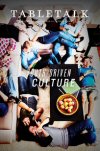
Tabletalk Magazine, March 2013: Youth-Driven Culture
- Editors: R.C. Sproul and Burk Parsons
- Series: Tabletalk Magazine
- Publisher: Ligonier Ministries
The March 2013 issue of Tabletalk features articles examining the church’s witness to a youth-driven culture. Past generations tended to value maturity, hard work, and sacrifice, but many in our current culture display selfishness, emphasize the idea that the new is always better than the old, and desire to achieve much with minimal effort. These cultural currents impact the church, and the church must recognize how they have done so. God’s Word calls Christians to mature in their faith and to honor the elderly among us. God’s people must grow in wisdom and integrity, and the elder men and women of the church must lead the way on this path to maturity.
Contributors include R.C. Sproul along with Stephen J. Nichols, Nathan Finn, Guy Prentiss Waters, Robert W. Carver, Tom Ascol, R.C. Sproul Jr., Steven J. Lawson, Jonathan K. Dodson, David Robertson, and Rosemary Jensen.
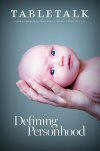
Tabletalk Magazine, April 2013: Defining Personhood
- Editors: R.C. Sproul and Burk Parsons
- Series: Tabletalk Magazine
- Publisher: Ligonier Ministries
The April 2013 issue of Tabletalk examines the nature of personhood. Throughout history, systematic persecution has resulted whenever oppressors redefine human personhood and rights in a way that excludes members of the oppressed group. Scripture, however, reveals that all human beings have dignity, personhood, and rights given to them by our Creator. Christians must affirm God’s perspective on human personhood and dignity, and, therefore, stand against every form of dehumanization in our day, especially the dehumanization evident in the scourge of abortion.
Contributors include R.C. Sproul along with W. Robert Godfrey, Mark E. Ross, Justin Holcomb, Randy Alcorn, R.C.Sproul Jr., Scotty Smith, Ted Turnau, and Rosemary Jensen.

Tabletalk Magazine, May 2013: The Shema
- Editors: R.C. Sproul and Burk Parsons
- Series: Tabletalk Magazine
- Publisher: Ligonier Ministries
The May 2013 issue of Tabletalk features articles examining the heart of Israel’s confession of faith as found in Deuteronomy 6:4–9. The opening words of this passage, known as the Shema, have been repeated by the faithful for millennia: “Hear, O Israel: The Lord our God, the Lord is one. You shall love the Lord your God with all your heart and with all your soul and with all your might.” In these words, God reveals to his people something fundamental about his nature as well as what is required of us in light of who he is. Our Lord Jesus, when asked, “What is the greatest commandment?” quoted these words. They remain as relevant as ever.
Contributors include R.C. Sproul along with Bryan Estelle, Robert Rothwell, Mark Jones, Curt Heffelfinger, Michael Morales, Miles Van Pelt, Nick Batzig, R.C. Sproul Jr., Sally Lloyd-Jones, W. Robert Godfrey, Geoff Stevens, and John Piper.

Tabletalk Magazine, June 2013: Faith and Repentance
- Editors: R.C. Sproul and Burk Parsons
- Series: Tabletalk Magazine
- Publisher: Ligonier Ministries
The June 2013 issue of Tabletalk features articles examining faith and repentance. The words “faith” and “repentance” are misunderstood by many people, including a large number of professing Christians. Skeptics caricature faith as the opposite of reason. Richard Dawkins, for example, has defined faith as “belief in spite of, even perhaps because of, the lack of evidence.” Repentance is sometimes seen by Christians as optional. Because faith is central to the message of the Bible, and because faith and repentance are demanded of all who hear the message of Christ, it is necessary that we come to a true understanding of the meaning of these words—not in order to increase our vocabulary, but in order that we might trust and obey the living God.
Contributors include R.C. Sproul along with Guy Richard, Sinclair Ferguson, Joel Beeke, Keith Mathison, R.C.Sproul Jr., Trip Lee, Douglas J. Moo, Cal Thomas, and Abdul Saleeb.

Tabletalk Magazine, July 2013: Out of the Abundance of the Heart
- Editors: R.C. Sproul and Burk Parsons
- Series: Tabletalk Magazine
- Publisher: Ligonier Ministries
The July 2013 issue of Tabletalk features articles examining the right use of the tongue in our relationship to God and neighbor. Our God speaks, and when he created man in his image, he gave man the gift of speech in order that we might have communion with him. Mankind has misused this gift, however. Rather than praising God, we take his name in vain. Rather than building our neighbor up, we flatter and gossip and slander. Christians are called to love the Lord our God with all of our heart and mind, and to love our neighbor as ourselves. One way that we practice such love is through our words. Out of the abundance of the heart the mouth speaks.
Contributors include R.C. Sproul along with Andrew Peterson, Derek Thomas, Jeffrey Jue, Iain Campbell, Jared Wilson, Timothy Paul Jones, John Sartelle, Dane Ortlund, Scott Sauls, R.C. Sproul Jr., Chan Kilgore, Richard Gamble, Mary Kassian, and Michael Beates.
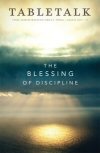
Tabletalk Magazine, August 2013: The Blessing of Discipline
- Editors: R.C. Sproul and Burk Parsons
- Series: Tabletalk Magazine
- Publisher: Ligonier Ministries
The August 2013 issue of Tabletalk examines the blessing of discipline. To use the words “blessing” and “discipline” in the same sentence sounds strange to our modern ears, but that is precisely why it is important to address the issue from a biblical perspective. Although Scripture speaks often about the goodness of godly discipline, many in our culture and even within our churches do not consider discipline to be a blessing. We think discipline conflicts with Christian liberty. We think discipline is a synonym for tyranny. In short, we think incorrectly. We forget that discipline begins with God and is grounded in his love for us, and we forget that all other forms of discipline reflect the loving discipline of God.
Contributors include R.C. Sproul along with J. Mark Beach, Steven J. Lawson, Tom Ascol, Fred Greco, Alexander Strauch, R.C. Sproul Jr., Elyse Fitzpatrick, Phil Johnson, Dave Furman, and Michael Oh.

Tabletalk Magazine, September 2013: The 13th Century
- Editors: R.C. Sproul and Burk Parsons
- Series: Tabletalk Magazine
- Publisher: Ligonier Ministries
The September 2013 issue of Tabletalk features articles examining the thirteenth century of church history. The thirteenth century was a century of contrasts. It witnessed the heights of barbarianism with the Mongol invasion of eastern Europe. It witnessed the heights of scholastic theological endeavors with the work of Thomas Aquinas. The battle for power in church and state continued as Pope Gregory IX dueled with the Emperor Frederick II, and the battle for the hearts of the people continued with the rise of several monastic orders. This issue will help us better understand where we are by looking closely at where we have been.
Contributors include R.C. Sproul along with Nicholas R. Needham, Ryan Reeves, David S. Hogg, George Grant, R.C. Sproul Jr., Simonetta Carr, Alvin Reid, Janet Mefferd, and Randy Alcorn.
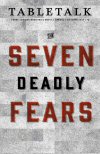
Tabletalk Magazine, October 2013: The Seven Deadly Fears
- Editors: R.C. Sproul and Burk Parsons
- Series: Tabletalk Magazine
- Publisher: Ligonier Ministries
The October 2013 issue of Tabletalk features articles examining our fears. We are afraid of dying. We are afraid our spouses or our children will die. We are afraid of losing our faith. We are generally afraid of everything and everyone except God. And we have forgotten what Paul said: “Do not be anxious about anything, but in everything by prayer and supplication with thanksgiving let your requests be made known to God. And the peace of God, which surpasses all understanding, will guard your hearts and your minds in Christ Jesus” (Phil. 4:6–7). This issue will address our fears and how they are overcome in Christ.
Contributors include R.C. Sproul along with David Powlison, Jonathan Leeman, Nick Batzig, Kris Lundgaard, Richard Pratt, Thomas Schreiner, Edward Welch, Kim Riddlebarger, Ray Ortlund, R.C. Sproul Jr, Kelly Kapic, Harry Reeder, Tony Reinke, and Paul Washer.

Tabletalk Magazine, November 2013: To Enjoy Him Forever
- Editors: R.C. Sproul and Burk Parsons
- Series: Tabletalk Magazine
- Publisher: Ligonier Ministries
The November 2013 issue of Tabletalk features articles on the theme of God’s presence with his people. As the Westminster Shorter Catechism explains, man’s chief end is to glorify God and enjoy him forever. This is why God created man, yet man’s relationship with God was severed by man’s sin, and man was exiled from God’s presence. Throughout Scripture, we see God working to reestablish his presence with man in the tabernacle, in the temple, in the word of the prophets, and ultimately in Jesus Christ—Immanuel. And he establishes his presence with man in order that man might once again glorify and enjoy him forever.
Contributors include R.C. Sproul along with Ra McLaughlin, John D. Currid, John R. Sittema, T.D. Alexander, Daniel R. Hyde, David Murray, John L. Mackay, Gerald M. Bilkes, Ben Dunson, S.M. Baugh, R.C. Sproul Jr, J.D.Greear, Michael G. Brown, and Nathan Wilson.
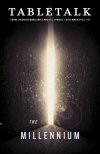
Tabletalk Magazine, December 2013: The Millenium
- Editors: R.C. Sproul and Burk Parsons
- Series: Tabletalk Magazine
- Publisher: Ligonier Ministries
The December 2013 issue of Tabletalk examines the biblical doctrine of the millennium. Chapter 20 of the book of Revelation has been the source of controversy for almost two thousand years. The interpretation of this chapter, the only place in the Bible that speaks explicitly of a thousand-year reign of Christ, is made particularly difficult because it is found within a book that is filled with imagery, symbolism, and allusions to Old Testament apocalyptic texts. Well-meaning Christians, therefore, have interpreted the millennium of Revelation 20 in a number of different ways. This issue of Tabletalk will seek to explain the main views of the millennium as well as assist readers in understanding some of the details of the prophecy in Revelation 20.
Contributors include R.C. Sproul along with Keith Mathison, Cornelis Venema, Douglas Kelly, Dennis Johnson, Eric Watkins, R.C. Sproul Jr, J.D. Bridges, Mark Jones, Al Mohler, and Ed Stetzer.
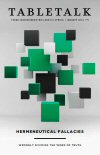
Tabletalk Magazine, January 2014: Hermeneutical Fallacies
- Editors: R.C. Sproul and Burk Parsons
- Series: Tabletalk Magazine
- Publisher: Ligonier Ministries
The January 2014 issue of Tabletalk examines some of the most common hermeneutical and exegetical fallacies that are committed by those who study Scripture. All Christians have the right to study the Word of God, but all Christians also have the corresponding responsibility to avoid twisting its meaning. When believers misinterpret Scripture through the exercise of fallacious exegetical practices, the ministry and witness of the church is damaged. When we fall into these hermeneutical fallacies, we bear false witness concerning what God has said in his Word. By looking carefully at the most common hermeneutical fallacies, all Christians can be better equipped to rightly handle the Word of truth (2 Tim. 2:15).
Contributors include R.C. Sproul along with Daniel M. Doriani, Robert J. Cara, Douglas J. Moo, Andreas J. Kostenberger, Anthony J. Carter, R.C. Sproul Jr., Archie Parrish, James L. Harvey III, Ed Stetzer, and Guy Prentiss Waters.

Tabletalk Magazine, February 2014: Hell
- Editors: R.C. Sproul and Burk Parsons
- Series: Tabletalk Magazine
- Publisher: Ligonier Ministries
The February 2014 issue of Tabletalk examines the biblical doctrine of eternal punishment. This doctrine has come under increasing attack in recent years, not only by those outside the church who ridicule the very idea, but also by many within the church who reject it for misguided reasons. Many argue that the doctrine of hell is unjust. Others argue that it is unloving. Some argue that it is inconsistent with the idea of God’s victory over evil. The reasons for the rejection of the doctrine of hell are many and varied, but the fundamental question remains the same: What hath God said? When we focus on this question, the answer is clear. The consistent teaching of the Bible is that those who reject Christ will be cast into the lake of fire, where they will be punished forever.
Contributors include R.C. Sproul along with John MacArthur, Robert A. Peterson, John Blanchard, Christopher W. Morgan, Steven J. Lawson, R.C. Sproul Jr., Michael Reeves, Brad Waller, Jay E. Adams, Joe Carter, Tim Challies, Albert N. Martin, and Eric B. Watkins.

Tabletalk Magazine, March 2014: John Knox and the Scottish Reformation
- Editors: R.C. Sproul and Burk Parsons
- Series: Tabletalk Magazine
- Publisher: Ligonier Ministries
The March 2014 issue of Tabletalk examines the life and work of John Knox and the Scottish Reformation. John Knox might be considered by some an unlikely prospect to lead a reformation in the church, but that time and place required his blunt and uncompromising personality. The Reformation in Scotland did not come without personal cost to Knox and those who followed his call. These men and women suffered greatly for their faith, and because of their sacrifice, the Scottish Reformation had an influence far beyond the boundaries of this small country. This issue of Tabletalk will seek to explain the ongoing significance of Knox and the Reformation he spearheaded in his native land.
Contributors include R.C. Sproul along with Stephen J. Nichols, Sinclair B. Ferguson, Aaron C. Denlinger, Donald Fortson, R.C. Sproul Jr., Gloria Furman, James R. White, Allan Fisher, George Robinson, Tim Challies, John MacArthur, Albert N. Martin, Eric B. Watkins, and Thomas Brewer.
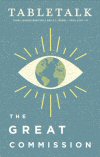
Tabletalk Magazine, April 2014: The Great Commission
- Editors: R.C. Sproul and Burk Parsons
- Series: Tabletalk Magazine
- Publisher: Ligonier Ministries
The April 2014 issue of Tabletalk features articles on the Great Commission given by Jesus to His disciples: “All authority in heaven and on earth has been given to me. Go therefore and make disciples of all nations, baptizing them in the name of the Father and of the Son and of the Holy Spirit, teaching them to observe all that I have commanded you. And behold, I am with you always, to the end of the age” (Matt. 28:18–20). This issue of Tabletalk will seek not only to explain carefully what Jesus meant by these words, but also to apply these words to the actual situations Christians face every day.
Contributors include R.C. Sproul along with L. Michael Morales, Roland Barnes, Karl Dahlfred, Dave Eby, Ed Stetzer, J.V. Fesko, Victor Cruz, Gerrit Scott Dawson, R.C. Sproul Jr., Jared C. Wilson, Jon D. Payne, John Freeman, Gene Edward Veith, Tim Challies, John MacArthur, Albert N. Martin, and Eric B. Watkins.
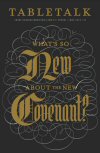
Tabletalk Magazine, May 2014: What’s so New about the New Covenant
- Editors: R.C. Sproul and Burk Parsons
- Series: Tabletalk Magazine
- Publisher: Ligonier Ministries
The May issue of Tabletalk examines the biblical doctrine of the new covenant. Throughout the Old Testament, we read of God establishing various covenants with Noah, with Abraham, with Israel, and with David. Israel continually violated the terms of the covenant made with them at Sinai, and they were exiled as a result. The prophet Jeremiah looked beyond the time of Israel’s judgment to a time of restoration when God would make a new covenant with his people “not like the covenant that I made with their fathers on the day when I took them by the hand to bring them out of the land of Egypt, my covenant that they broke.” This issue of Tabletalk will seek to clarify exactly what is new and different about the new covenant.
Contributors include R.C. Sproul along with Mark Jones, Richard L. Pratt Jr., Guy Prentiss Waters, J. Mark Beach, John W. Tweeddale, R.C. Sproul Jr., Eric J. Alexander, Jared C. Wilson, Aimee Byrd, Joe Carter, and others.

Tabletalk Magazine, June 2014: Guilt by Association
- Editors: R.C. Sproul and Burk Parsons
- Series: Tabletalk Magazine
- Publisher: Ligonier Ministries
The June 2014 issue of Tabletalk examines what Scripture teaches concerning our associations with other people both inside and outside the visible church. With whom can we unite ecclesiastically and theologically? Where do we draw the line? Does endorsement of a book entail endorsement of everything an author believes? How do we interact with those who are under church discipline? How do we relate to their families? When should we break fellowship with a professing Christian? If we broke fellowship with someone and another person fellowships with them, should we break fellowship with the second person? This issue of Tabletalk will seek to answer these and many other important practical questions.
Contributors include R.C. Sproul, Tim Challies, John MacArthur, David Murray, Sinclair B. Ferguson, Iain D. Campbell, Albert Martin, Eric B. Watkins, R.C. Sproul Jr., Susan Hunt, John P. Sartelle, and others.

Tabletalk Magazine, July 2014: The 14th Century
- Editors: R.C. Sproul and Burk Parsons
- Series: Tabletalk Magazine
- Publisher: Ligonier Ministries
The July 2014 issue of Tabletalk features articles examining the fourteenth century. From the the Black Death, which ravaged Europe, killing over one-third of the population, to the so-called Babylonian Captivity of the Papacy and the Western Schism, during which time several men simultaneously claimed to be the true pope, the fourteenth century was not a quiet time. This century witnessed the rise of heretical mystics such as Meister Eckhart as well as forerunners to the Reformation such as John Wycliffe. This issue of Tabletalk will help Christians better understand where we are today by looking closely at where we have been in the past.
Contributors include R.C. Sproul, Nicholas R. Needham, Stephen J. Nichols, R. Scott Clark, Peter A. Lillback, Albert N. Martin, John MacArthur, Dan Dewitt, and Joel R. Beeke.

Tabletalk Magazine, August 2014: The Ordinary Christian Life
- Editors: R.C. Sproul and Burk Parsons
- Series: Tabletalk Magazine
- Publisher: Ligonier Ministries
This issue of Tabletalk features articles explaining that the ordinary Christian life, the life to which all believers are called by the Lord Jesus, is, by its very nature, the radical Christian life. Faithful obedience to God in every sphere of life is considered out of the ordinary by many Christians, but only because we are often disobedient to the radical, transformative call of Christ. This issue will help us better understand what the ordinary Christian life looks like in our families, in our churches, and in our vocations. It will point out examples of ordinary believers throughout Scripture.
Contributors include R.C. Sproul, Michael Horton, Tim Challies, Tedd Tripp, Sean Michael Lucas, Erik Raymond, R.C. Sproul Jr., Nancy Guthrie, Joe Holland, Russell D. Moore, Derek W.H. Thomas, and Burk Parsons.
This title is included in the following collections
You can save when you purchase this product as part of a collection.
Tabletalk Magazine: Feb. 1989–...
$730.37$499.99Biblioteca Portfólio 2025
$1,999.99$1,399.99Theology Journal Bundle 7.4 (1...
$1,529.99$1,529.99Scholar's Journal Collection (...
$15,583.80$1,949.99
- $2,274.99$1,974.99
- $2,199.99
- $3,499.99$2,449.99
- $9,975.82$2,499.99
- $2,699.99
- $2,999.99
- $2,999.99
- $4,064.99$3,389.99
- $4,749.99$3,562.49
- $3,914.99
- $17,960.82$4,499.99
- $4,749.99
- $4,749.99
- $4,749.99
- $11,399.99
- $23,999.99$17,999.99
- $21,749.99
- $24,999.99
About the Editors
R.C. Sproul is founder and president of Ligonier Ministries and president of Ligonier Academy. He also serves as the senior pastor of Saint Andrew’s in Sanford, Florida. He has written more than 70 books including Defending Your Faith, Abortion: A Rational Look at an Emotional Issue, The Truth of the Cross, Truths We Confess, and commentaries on Romans and John in the St. Andrew’s Expositional Commentary Series (5 vols.).
Burk Parsons serves as editor of Tabletalk and associate pastor of Saint Andrew’s in Sanford, Florida. He is editor of the books Assured by God: Living in the Fullness of God’s Grace and John Calvin: A Heart for Devotion, Doctrine, and Doxology.
Reviews
4 ratings

Forrest Cole
11/9/2021
Doug Hull
3/27/2017

Bill
1/15/2017
Prophet_kevin
4/1/2016